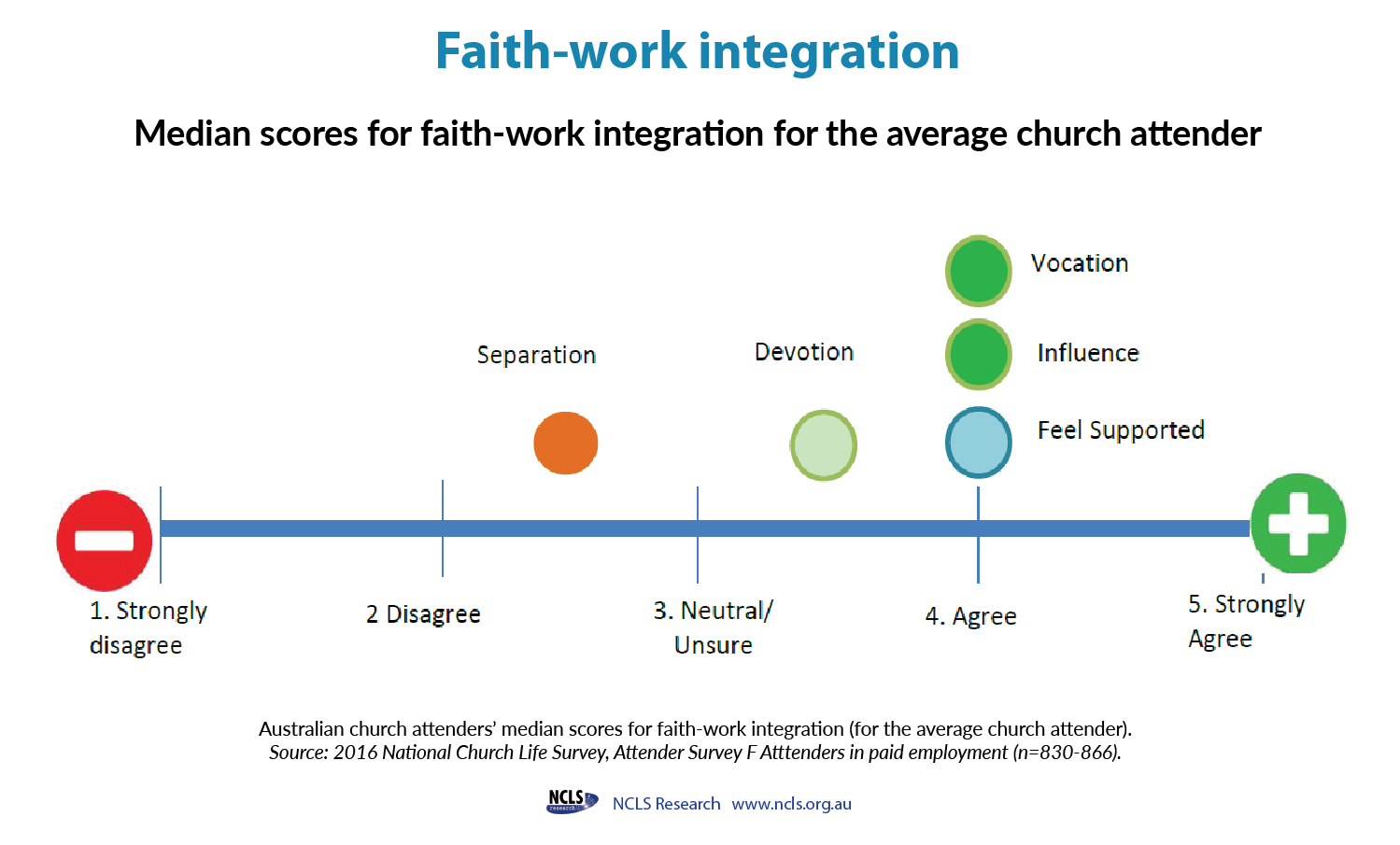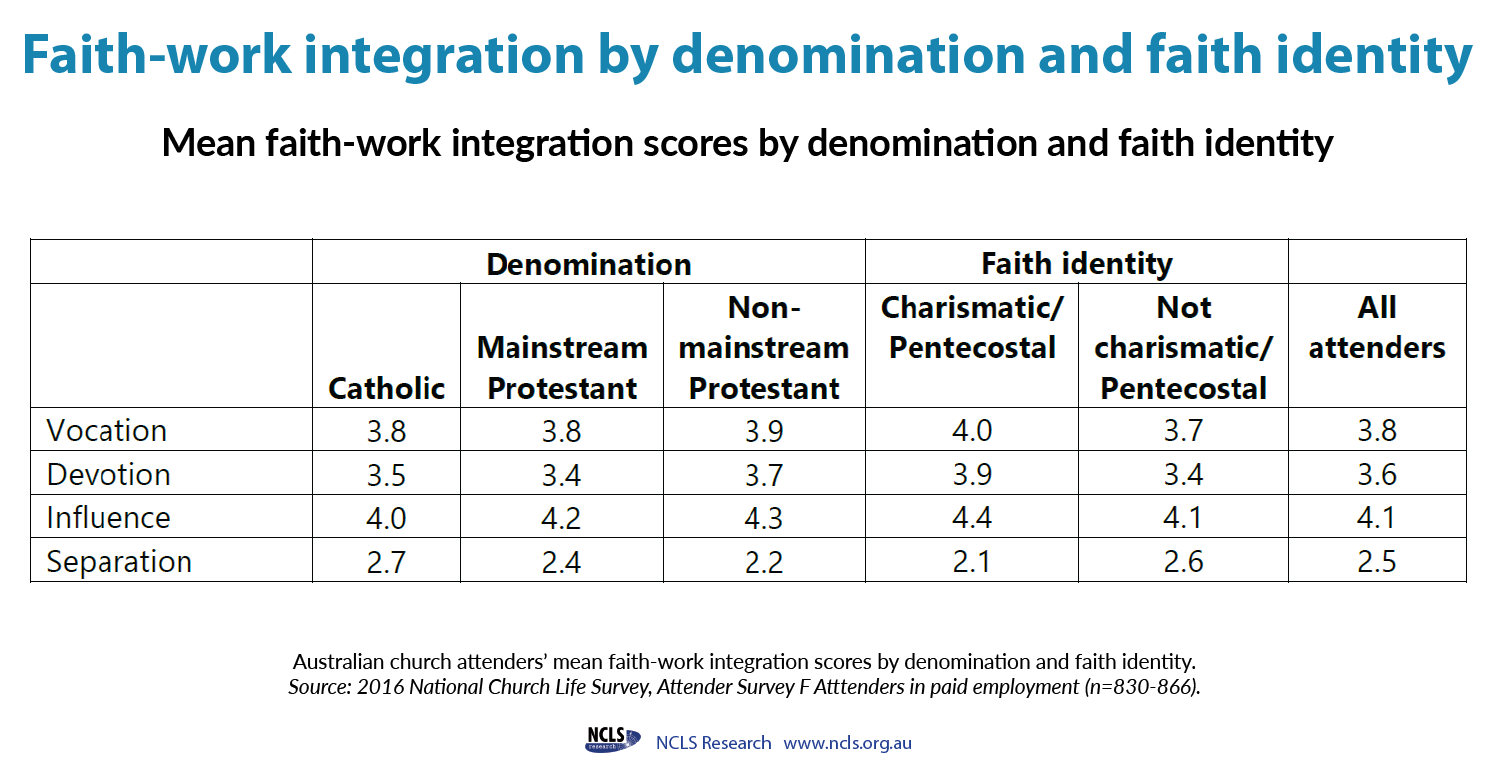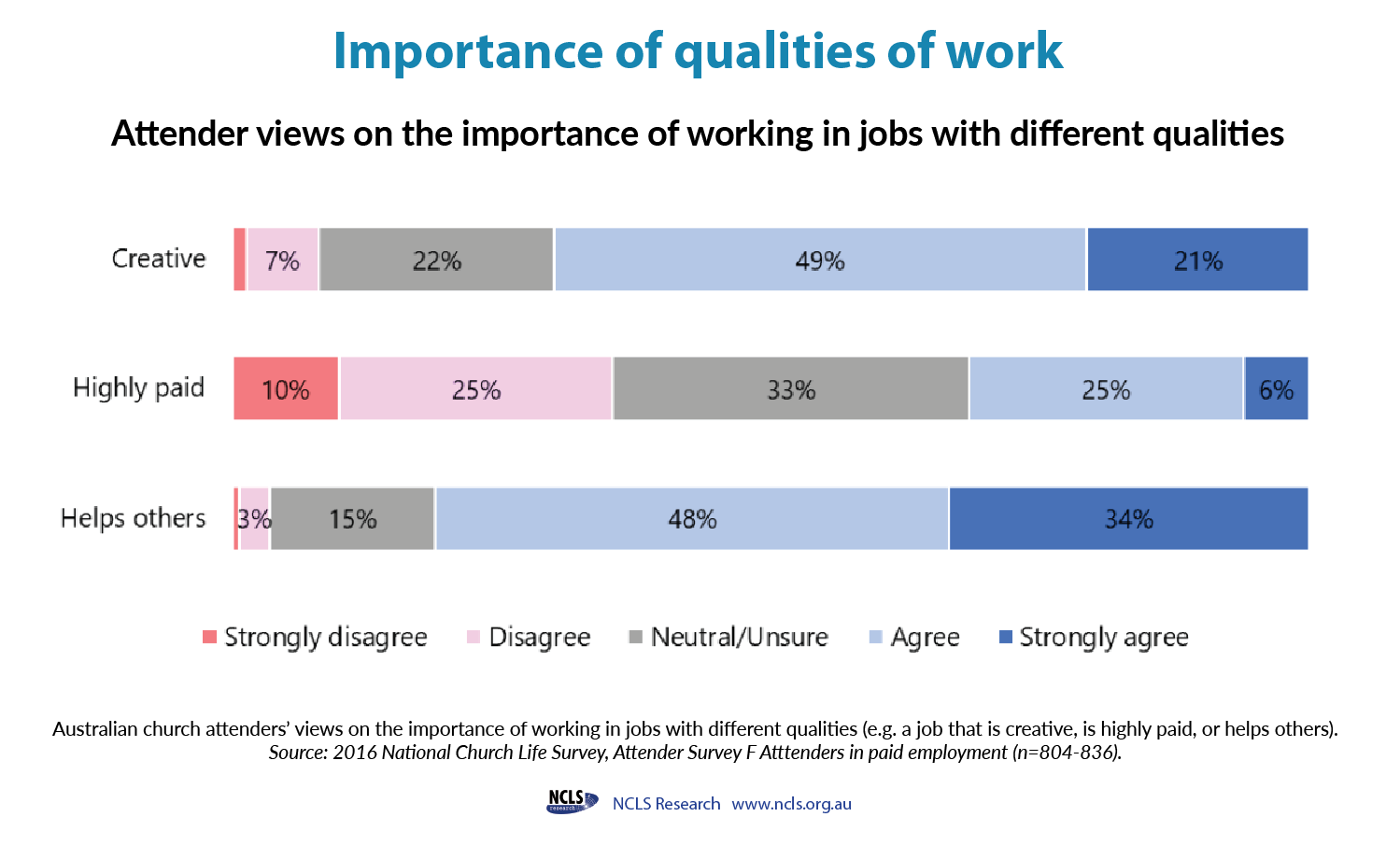Vocation is a commonly used term to describe a person's sense that they have been called to their work and that their work is meaningful.
In our study of faith and work in churchgoers, we used four factors, including Vocation, Devotion, Influence and Separation to measure church attenders' integration of faith and matter related to work.
Our study found moderately high levels of faith-work integration in the experiences and practises of Australian churchgoers. Feeling supported by the local church as well as a churchgoer's religiousness are both positively associated with such integration. As well, faith-work integration is strongly expressed in valuing work that helps others and churchgoers reported a preference for a job with creativity, over one with high pay.
The workplace is a context in which Christians interact with others on a daily basis
One of the primary ways in which people interact with the world is through their work. The concept of vocation, the calling to Christian living in diverse ways, that enable the expression and development of passions and gifts, and that contribute to God’s kingdom, has a long pedigree in Christian thought and practice related to work. The workplace is also a context in which Christians interact with others on a daily basis, with many opportunities to practise and develop fruits of the Spirit – love, joy, peace, patience, kindness, goodness, faithfulness, gentleness and self-control (Galatians 5:22-23). Moreover, the workplace provides opportunities for evangelism or evangelisation.
Yet, many workers in the Western world struggle to integrate their religious beliefs and practices with their lives and responsibilities within the workplace community. There may be conflicts between organisational expectations and personal practices, if, for example, work is scheduled when the employee usually attends religious worship. The workplace may prioritise very different goals, such as material profit versus community service. There may also be a clash between organisational and personal values, such as productivity versus caring relationships.
How is faith and work integrated for Australian church attenders?
Our main research question was ‘How is faith and work integrated for Australian church attenders?’ We were also interested in whether factors such as a person’s age, gender or education, had an impact. Further, are religious factors, such as a person’s practice of faith or their denominational tradition associated with faith-work integration?
For this part of the study, we focussed on attenders in paid employment. They were asked the extent to which they agreed or disagreed with various statements. A statistical technique called factor analysis was used to group these questions into four scales reflective of broader concepts to do with the integration of faith and work.
1. Vocation: attenders’ sense that they have been called to their work and that their work is meaningful;
2. Devotion: the practice and deepening of faith in the workplace;
3. Influence: the extent to which faith impacts on how the individual conducts their work; and
4. Separation: a disconnect between faith and the workplace.
To find out more about how scales were calculated and items in each scale, see the technical report.
The average attender experiences and practices moderate levels of faith-work integration
Using the median scores on each scale, the figure below shows that the average attender:
• Agreed that their work is a calling that makes a difference in the world (Vocation).
• Slightly agreed that they pray regularly for colleagues and their faith had deepened as a result of work (Devotion).
• Agreed that their faith influences their actions at work (Influence).
• Slightly disagreed that they separated their faith from their working life (Separation).

There are small differences in faith-work integration between different denominations
Survey results shows that Separation was highest among Catholics. Influence was highest among non-Mainstream Protestants. Faith-work integration was a little higher among those who identified with charismatic/Pentecostal approaches to faith than among other attenders.

Feeling supported by their church is positively related to attenders’ faith-work integration
When attenders feel that they are supported by their churches:
• they tend to have a stronger sense that work is meaningful (Vocation)
• their faith tends to be deepened in the workplace (Devotion)
• their faith tends to impact more on how they conduct their work (Influence).
In contrast, when a person does not feel supported by their church, there is more likely to be a disconnect between their faith and the workplace (Separation).
How religious an attender is strongly predicts how well faith and work is integrated for them
Religiousness is the main influence on the integration of faith and work, predicting Vocation, Devotion, Influence and Separation. Religiousness is measured by:
• the regular personal and communal practice of faith
• the importance of God in a Christian’s life and
• a growing faith.
The average church attender agrees that it is important to them to have a job where they can be creative and help others and is neutral about a highly paid job
The results for importance of working in jobs with different qualities are given in the figure below. Considering the median responses, the average attender:
• agreed that it was important to them to have a job where they can be creative
• was neutral about whether it was important to them to have a highly paid job
• agreed that it was important to them to have a job where they can help others.

Faith-work integration is strongly expressed in valuing work that helps others
Different patterns of prediction were observed for different sorts of work. Vocation and Influence predicted the importance of being in a helping job and to a lesser degree being in a creative job, whereas Separation predicted the importance of being in a highly paid job. Faith-work integration is strongly expressed in valuing work that helps others, which is in line with Christian norms of love and care of neighbour. Gender predicted the importance of the different types of work – with being male a positive predictor of the importance of both creative and highly paid work, and being female a positive predictor of the importance of being in a helping job.
One of the primary ways in which people interact with the world is through their work. Yet, many workers in the Western world struggle to integrate their religious beliefs and practices with their lives and responsibilities within the workplace community.
Encouragement and support from churches and other networks is critical in this context, not only in relation to questions such as choice of occupation, but also to help Christians to address issues that concern them in their daily work. Church leaders can play an important role in supporting such integration within churchgoers. More information on our findings about church support, is available in our article Churches support faith-work integration but there's room for improvement. As well, we provide a profile of employed churchgoers in our article Church attenders in employment have distinctive characteristics
Read case studies of local churches
Mental health support from churches
one year ago
Mental health support rated as good yet many churches unaware
Read moreEmployment changes things
3 years ago
by Kathy Jacka, Miriam Pepper
'Time strapped' people with less time for volunteering and participating at church.
Read moreAttenders in employment have distinctive characteristics
3 years ago
by Miriam Pepper, Ruth Powell, Kathy Jacka
Church attenders in paid employment have distinctive characteristics
Read moreBridging the work faith divide
3 years ago
One church' story on how they help their churchgoers to integrate their faith with their work life.
Read moreChurches support faith work integration but room for improvement
3 years ago
by Miriam Pepper, Kathy Jacka, Ruth Powell
Read moreReventure faith and work study
6 years ago
A research project to investigate faith and work integration for Australian church attenders in paid employment
Read moreRead case studies of local churches

Thank God it's Monday
Paul Bartlett, Lighthouse Church Wollongong

Bridging the work faith divide
Jo Wilton, C3 Church Miranda




